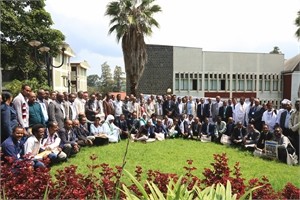Jimma University organized the Second International Conference on Oromo Studies under the grand theme ‘Gadaa: The Indigenous Knowledge System of Oromoo’. The conference was held from 1st to- 2nd June, 2017 at Jimma University College of Agriculture and Veterinary Medicine Conference Hall. Abbaa Gadaas’ from Jimma Zone, dignitaries, representatives from several government institutions, university presidents and scholars engaged in Oromo studies have attended the two days conference.
The Conference is aimed at creating a platform that enables multiple parties/stakeholders/ meet to work together, and with the Institute/ University, towards the restoration and sustaining of the totality of Gadaa values through various initiatives including research, education, training, conferences, documentation and dissemination of information.
The conference was started by the blessing of Abbaa Gadaas’ who colorfully expressed their good wishes and blessings in accordance with the Oromo culture.
A welcoming speech was delivered by.Dr. Tsige Ketema, Vice President for Research and Community Services. In her speech she highlighted that Gadaa is a system where core values such as democracy and equality which include all age levels and gender are practiced since long time ago. As a system, she said, Gadaa encompasses values such as peaceful transfer of power, coherent and strong institutions that involve and educate all age levels, authentic philosophical grounds out of which concepts of time and space are extracted.
Professor Fikre Lemessa, President of Jimma University, made an opening speech, in which he emphasized on the fact that Gadaa has become an intangible world heritage. In connection to that, he said, “as the Oromo proverb goes, ‘Fardi hingeessa malee hinwaranu;’ designing a strategy for its inclusion to academics, establishing centers of Gadaa studies in institutions such as the Institute of Oromo Studies is important to ensure the development of the system.”
He also underlined the importance of having denotation that links the current quest with the methods and substance of our predecessors who orally generated and transmitted their deep understanding of the cosmos to enable future generations to build on the legacies their ancestors maintained using more advanced and sophisticated technologies.
Professor Tesema Ta’aa of Addis Ababa University delivered a keynote speech in which he underlined the great values of Gadaa in terms of the fair play of dichotomies: male and female, young and old, self and other, the haves and the not haves are democratically and fairly treated and thus making Gadaa an egalitarian system.
At the subsequent stages of the conference, thirty five papers were presented by several prominent scholars in the plenary and five parallel sessions. Dr. Gemechu Megerasa, Dr. Aneesa Kassam, Dr. Taddesse Berisso, Professor Marco Bassi and Chikage Oba-Smidt are among the scholars who presented lead papers during the plenary session of the conference.
The final session of the conference, chaired by Professor Taye Tolemariam, V/P for Academic Affairs at JU, discussed the way forward to glean out outstanding issues which have to be emphasized on to bring about the successful accomplishment of the Institute’s objective, namely studying the Oromo. Dr. Teshome Egeree, Director of the Institute of Oromo Studies, presented an overview on the establishment, the ongoing activities and future plans of the Institute. The points raised during the final session were instrumental in shaping the discussions and later on substantiated by the panelists of the session and the participants.
Finally, it was agreed that, the study on the Oromo should focus on the production of high quality research and its dissemination, to ensure scientific and evidence based promotion of the Oromo cultural values and practices. Besides, the conference consensually agreed on the need to gather all research outputs and books at national and international level in order to organize an archive of Oromo studies. Doing so would, as understood by the conference, enable the institute to support future researchers and scholars, both at the national level and beyond.
The Conference was wrapped up after certificates were awarded to paper presenters.

